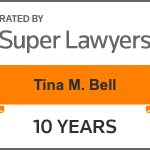Indianapolis Newborn Brain Hemorrhage Attorney
Helping people is our priority



Since 1993

At Christie Farrell Lee & Bell, our team of specialized attorneys has extensive experience in dealing with birth injuries, and we are here to provide you with the legal guidance and support you need to claim justice for your child and your family.
The birth of a child should be joyous, an occasion filled with hope and promise. Unfortunately, for some families, this moment is scarred by medical complications caused by negligence. If your newborn has suffered a brain hemorrhage due to medical malpractice, our personal injury lawyers are here to help you claim justice and compensation.
What Causes Neonatal Brain Hemorrhage?
A newborn brain hemorrhage is a type of injury sustained during birth caused by a variety of factors, ranging from medical malpractice to unavoidable complications during labor and delivery.
According to the Indiana State Department of Health, Indiana has a neonatal mortality rate of 6.7 per 1,000 births. After a newborn brain hemorrhage injury, it’s crucial to pinpoint the root cause to establish liability and determine if you have a case to pursue legal action.
Common causes include:
- Trauma during delivery: If the baby’s head is subjected to excessive force during delivery, it can cause bleeding in the brain.
- Oxygen deprivation: If the baby’s brain is deprived of oxygen during delivery, it can also cause brain damage and bleeding.
- Infections: Infections in the mother or baby can also increase the risk of neonatal brain hemorrhage.
Long-Term Consequences
A neonatal brain hemorrhage commonly causes long-term consequences, leading to developmental delays, cognitive impairments, and in severe cases, death. Early intervention and ongoing medical treatment are often necessary, adding emotional and financial pressure to families who are experiencing such a difficult situation.
Some of the long-term consequences that are more common in these types of cases include:
- Cerebral palsy: A neurological disorder that affects movement and coordination.
- Developmental delays: Brain hemorrhages can cause developmental delays, including delays in speech and motor skills.
- Seizures.
- Intellectual disabilities: Brain hemorrhages often cause intellectual disabilities, including learning disabilities and cognitive impairments.
If your child has unfortunately suffered a brain hemorrhage due to medical malpractice, it’s important to seek legal representation to ensure you receive the compensation you need to provide for your child’s long-term care. We know that no amount of money can compensate for such negligence, but we’ve also witnessed how compensation is essential to ensure the future of the child and the family.
Speak with a personal injury lawyer today. Call: 317-488-5500
How Our Newborn Brain Hemorrhage Attorneys Can Help You Claim Justice
With decades of experience assisting medical malpractice victims, we have seen many families struggling with unfair settlement, lack of accountability, and healthcare institutions that are not providing the standard of care to patients. In many cases, we helped these families stand for the rights of their injured child, fight for justice, and set precedents to prevent negligent people from harming more patients in the future.
Understanding Your Rights
The Indiana Code § 34-18 outlines the rights and responsibilities of both medical practitioners and patients in medical malpractice cases. We use these legal provisions to help you to make informed decisions about your case. So, under Indiana law, you are entitled to compensation if your child has suffered a brain hemorrhage due to medical malpractice.
Our attorneys at Christie Farrell Lee & Bell will outline what damages you can recover according to the specific circumstances of your case, and present the legal avenues available to you.
Calculating the Damages You Can Sue After a Newborn Brain Hemorrhage
Calculating damages in a newborn brain hemorrhage case is a complex process that takes into account not only immediate medical expenses but also long-term care costs, emotional distress, and loss of quality of life. These are some of the damages you can recover in a medical malpractice case:
- Medical expenses: This includes the cost of medical treatment, hospitalization, and ongoing care.
- Lost wages: If you have had to take time off work to care for your child, you can recover both past and future lost wages.
- Pain and suffering: This includes physical pain, emotional distress, and loss of enjoyment of life.
- Punitive damages: In some cases, you may be able to recover punitive damages, which are intended to punish the responsible party for their actions.
In this scenario, we can help you accurately assess these factors to ensure you receive the maximum amount of compensation possible for your damages.
Complete a Free Case Evaluation form now
The Process of Pursuing a Newborn Brain Hemorrhage Lawsuit
1. Initial Consultation
The first step in pursuing legal action is an initial consultation with a personal injury lawyer. During this first conversation, we assess the specific circumstances surrounding your case and outline the legal avenues available to you.
2. Investigation and Evidence Gathering
If you have a valid claim, your attorney will start by investigating the circumstances surrounding your child’s brain hemorrhage and collecting evidence to prove it was caused by negligence. This involves gathering medical records, consulting with medical experts, and collecting any other proof that can strengthen your case.
3. Filing the Lawsuit
Armed with a solid case, we will proceed to file the lawsuit against the responsible parties, be it a hospital, a medical practitioner, or other healthcare providers. This involves, among other tasks, drafting legal documents, serving the responsible parties, and preparing for trial (but don’t worry, we can handle all of this on your behalf).
4. Negotiation and Settlement
Many personal injury cases are settled out of court, by negotiating with the opposing parties to reach a fair settlement. If a settlement is reached, we will help you understand the terms of the settlement and ensure that you receive the compensation you are entitled to.
5. Trial
However, if a fair settlement cannot be reached, we will prepare to take your case to court. Our attorneys will represent you throughout the court proceedings and the litigation process, advocating for your rights and ensuring you get the maximum amount of compensation possible for your damages.
Click to contact us today
Request a Free Consultation With Our Newborn Brain Hemorrhage Lawyer in Indianapolis
At Christie Farrell Lee & Bell, our attorneys have handled birth injury cases since 1993, including those involving neonatal brain hemorrhage.
If your child has suffered a brain hemorrhage due to medical negligence, don’t hesitate to reach out for a free consultation. We will review your case, answer your questions, and help you understand your legal rights and options to pursue compensation.
Indianapolis Office
951 N Delaware St Indianapolis, IN 46202
Phone: 317-593-9202

Get a FREE Case Review
Schedule Your Free Consultation


















